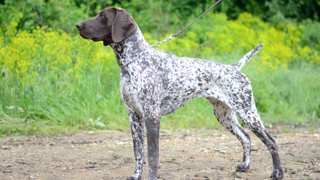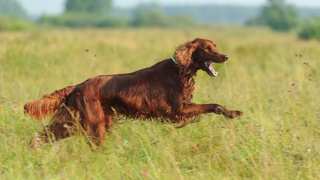Weimaraner food and diet choices are important in maintaining these dogs' health and well-being. Weimaraner dog food will need to be full of calories to match their extremely active lifestyle--but it needs to be high-quality food, not the cheap generic kind. There's an important reason for this: Weimaraners can be intolerant to grains like wheat, corn, and barley, which most cheap dog food has a lot of, so premium food (particularly one labeled as "Grain-Free") is best.
But specifically what to feed a Weimaraner? The general consensus among owners is high-quality, grain-free dry food. Not only does premium dry food provide substantial calories and nutrients, but since Weims are very big eaters, feeding a dog of this breed canned or fresh food will be outrageously expensive. Depending on its age and activity level, the typical adult Weim will need about three cups (1,900 calories) of food per day, divided into two meals. Weimaraner puppy food portions are somewhat less: a six-month-old Weim puppy, for example, requires about two cups (1,150 calories) divided into three meals. For more details, see this Weimaraner feeding guide:
Dog AgeDog WeightFood TypeAmountFrequency2 Months12 lbsDry0.3 cups3x/day3 Months30 lbsDry0.5 cups3x/day6 Months45 lbsDry0.7 cups3x/day9 Months55 lbsDry1.25 cups2x/day12 Months65 lbsDry1.5 cups2x/day18 Months+70 lbsDry1.5 cups2x/dayIt's important to try and and stick to the above-listed portions, because obesity can be a big problem in dogs of this breed. A fat Weimaraner will have digestive and breathing problems, and obesity can significantly shorten its lifespan. Another major issue for overweight Weimeraners: hip dysplasia, which is the abnormal formation of the hip socket that causes lameness and severe pain. Hip dysplasia normally begins when a dog is young--and its occurrence is much more likely in a puppy that's obese, as carrying around the extra weight puts undue stress on the hip joint. It's very important, therefore, not to allow your Weim puppy to pack on too many pounds.
Another main cause of obesity in this (or any) breed is "free-feeding," whereby food is left in the dog's bowl all the time, allowing it to eat anytime it wants. Veterinarians urge all Weimaraner owners to put their dogs' bowls down only at mealtimes, then pick it up 20 minutes or so after the dog begins eating. It's also recommended that you have a consistent daily feeding schedule for your Weim--and start scheduling meals when the dog is still a puppy, so it can become accustomed to eating at the same time every day.
If you're worried your Weimaraner is becoming obese, give the dog this simple Ribs Test: run a hand along its side, and if you can't feel any ribs, it's diet time. Decrease your Weim's daily food intake by one-fourth, and add an extra walk or play period to its daily exercise routine.







